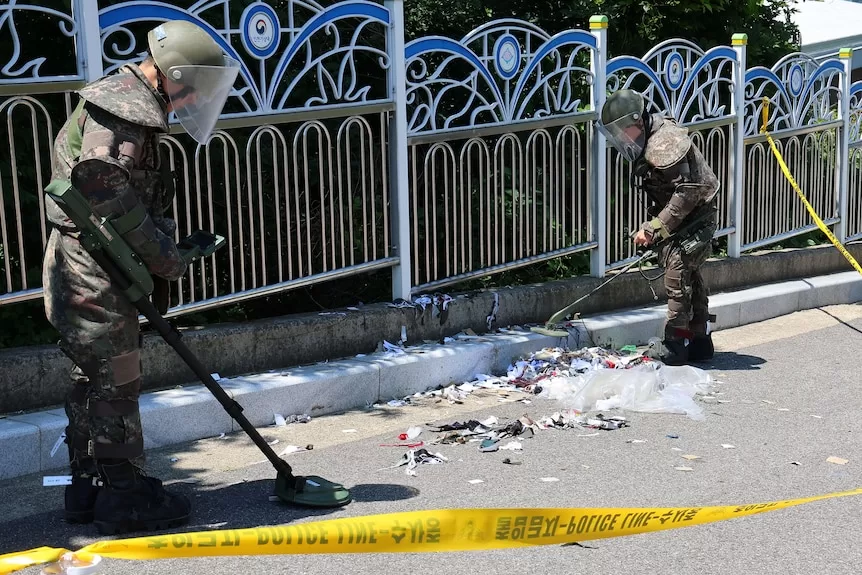- In short: South Korea has promised to take revenge after several hundred balloons carrying rubbish were sent over the border by North Korea.
- The military says about 600 balloons were sent over between Saturday night and Sunday morning.
- What’s next? North Korea says it will suspend the campaign, but has vowed to resume it if anti-North Korean leaflets are sent by South Korea.
South Korea says it will soon take “unbearable” retaliatory steps against North Korea over its launch of hundreds of garbage-carrying balloons across the border and other provocations.
In the past week, North Korea has floated about 900 huge balloons over the border to dump rubbish on South Korea, simulated nuclear strikes against its neighbour, and allegedly jammed GPS navigation signals in the South in an escalation of animosities between the rivals.
Early on Sunday, South Korea’s military said about 600 balloons were spotted between Saturday night and Sunday morning, and they were coming across the border at a rate of between 20 and 50 an hour.
Tied to the balloons were cigarette butts, scraps of cloth, waste paper and vinyl, but no dangerous substances, according to the Joint Chiefs of Staff.
South Korea’s national security director Chang Ho-jin said on Sunday that top officials at an emergency meeting decided to take “unbearable” measures against North Korea in response to the series of provocative acts.
He called the North’s balloon campaign and its alleged GPS signal jamming “absurd, irrational acts of provocation that a normal country can’t imagine”.
He accused North Korea of aiming to cause “public anxieties and chaos” in South Korea.
South Korean officials did not say what retaliatory steps they would take.
Late on Sunday, North Korean state media reported the balloon campaign would be temporarily stopped, citing a statement from the country’s vice defence minister.
State media KCNA reported that it would resume the campaign if the South sent anti-North Korean leaflets the other way.
Many observers say South Korea will likely resume front-line loudspeaker broadcasts into North Korea, which usually include criticism of the North’s abysmal human rights situation, world news and K-pop songs.
North Korea is extremely sensitive to such broadcasts because most of its 26 million people have no official access to foreign TV and radio programs.
It was North Korea’s second balloon bombardment in less than a week.
Between Tuesday and Wednesday, South Korean officials said they had found about 260 North Korean balloons carrying garbage and manure.
There have been no reports of major damage in South Korea, but officials warned the public to stay away from any balloon and report it to security forces.
North Korea said its balloon floating was a response to South Korean activists flying anti-Pyongyang propaganda leaflets via their own balloons across the border.
North Korea often responds with fury to balloons from South Korea.
In 2020, North Korea exploded an empty, South Korean-built liaison office in the North in anger over the South Korean balloon activities.
Experts say North Korea’s balloon campaign, reportedly the first of its kind in seven years, is meant to stoke an internal divide in South Korea over its conservative government’s tough policy on the North.
They say North Korea is also expected to further ramp up tensions ahead of the US presidential election in November.
Since 2022, North Korea has sharply increased its pace of weapons tests to build a bigger nuclear arsenal.
Last week, it fired a barrage of nuclear-capable weapons into the sea in a drill simulating a pre-emptive attack on South Korea.
AP/ABC
